Gold Medal Winner: 26 years on Davis Cup Team
Daniel Nestor
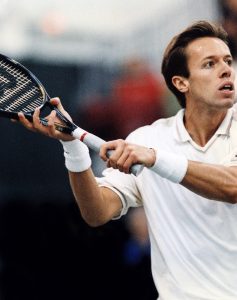 ONcourt: Nestor won 91 men’s doubles titles (with 11 different partners), including an Olympic gold medal at the 2000 Sydney Olympics, four Tour Finals titles, and twelve major doubles titles attained with seven different partners (eight in men’s doubles and four in mixed doubles). Nestor was the first man in history to win every major and Masters event, the Tour Finals, and an Olympic gold medal. He was a member of the Canadian Davis Cup team from 1992 to 2018. He first came to prominence in the public eye that year by defeating then world number one Stefan Edberg in a hard-fought singles match in Vancouver. He was part of the squad who made history for Canada in 2013 as they were the first Canadian team in the Open Era to reach the World Group semifinals.
ONcourt: Nestor won 91 men’s doubles titles (with 11 different partners), including an Olympic gold medal at the 2000 Sydney Olympics, four Tour Finals titles, and twelve major doubles titles attained with seven different partners (eight in men’s doubles and four in mixed doubles). Nestor was the first man in history to win every major and Masters event, the Tour Finals, and an Olympic gold medal. He was a member of the Canadian Davis Cup team from 1992 to 2018. He first came to prominence in the public eye that year by defeating then world number one Stefan Edberg in a hard-fought singles match in Vancouver. He was part of the squad who made history for Canada in 2013 as they were the first Canadian team in the Open Era to reach the World Group semifinals.
He has been nominated to the ITF Hall of Fame.
DN: It was always a dream of mine to represent Canada in any capacity so being a part of Davis Cup was very special.
Being a part of the team in 90 when we qualified the first time and Connell carried the team on his back was very special. Of course some crazy five set singles match against Edberg, Rios, Kuerten, qualifying again against Brazil in 2004 after so many years in qualifying, being a part of the team with the young stars, Pospisil, Raonic and making the semis in 2013, playing my last match and having all the young stars that led the latest charge on the same team. Most importantly, the camaraderie in the locker room, playing keep up with a soccer ball off the walls and knocking over so many things while at it, soccer tennis with the players and coaches always got competitive.
It was amazing to watch these young superstars come thru and win. They are most deserving as they have been setting a new standard of excellence in Canadian tennis year after year.
Canada’s Answer to Clay Court Battles
Martin Wostenholme
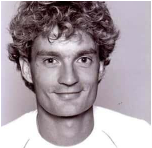 Martin Wostenholme (born October 11, 1962) is a Canadian former touring professional tennis and Davis Cup player. A right-handed predominantly base-line player, Wostenholme was from 1981 to 1984 a four-time All-Ivy Leaguer in singles at Yale University. He had a career ATP singles high ranking of world No. 84, which he attained in November 1985. His career ATP tour win-lost record stands at 49 and 84. In Davis Cup, Wostenholme had a career singles win-lose record of 12 and 8. He was a member of Canada’s first ever squad to play the World Group, in 1991/92. Martin also served as a Tennis Canada board member.
Martin Wostenholme (born October 11, 1962) is a Canadian former touring professional tennis and Davis Cup player. A right-handed predominantly base-line player, Wostenholme was from 1981 to 1984 a four-time All-Ivy Leaguer in singles at Yale University. He had a career ATP singles high ranking of world No. 84, which he attained in November 1985. His career ATP tour win-lost record stands at 49 and 84. In Davis Cup, Wostenholme had a career singles win-lose record of 12 and 8. He was a member of Canada’s first ever squad to play the World Group, in 1991/92. Martin also served as a Tennis Canada board member.
OC: What did Davis Cup mean to you while growing up as a player?
MW: I loved being part of a team and playing for everyone. It was such a wonderful feeling of support and honour mixed with the anxiety of trying to find a way through all sorts of challenges!
OC: What is your most vivid memory of Davis Cup?
We played in front of 9k very passionate fans in Chile. The locker rooms were under the stadium and you could feel the crowd above. To get to the court was a walk through dark, damp tunnels like a gladiator. You emerged into the bright sun, and the atmosphere was electric. As a competitor, it was every emotion all at once.
MW: What was your take on Canada’s recent Davis Cup win?
OC: Amazing job by the players, especially grinding through in doubles. A moment of triumph and pride for everyone on this multi-decade journey. The coaches all across Canada, the fans, Tennis Canada and everyone who made decisions along the way to give this team the opportunity. The win is for all of us who love the sport.
Gold Medal and Grand Slam Winner
Sebastien Lareau
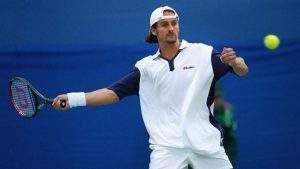 Lareau became the first Canadian to win a Grand Slam title by winning the 1999 US Open men’s doubles with his American partner Alex O’Brien. The right-handed Lareau achieved a career best singles ranking of world No. 76 in April 1995. Lareau reached a career-high doubles ranking of world No. 4 in October 1999. He won 16 doubles titles on the ATP Tour. He won the Gold Medal with Daniel Nestor in the Sydney Olympics
Lareau became the first Canadian to win a Grand Slam title by winning the 1999 US Open men’s doubles with his American partner Alex O’Brien. The right-handed Lareau achieved a career best singles ranking of world No. 76 in April 1995. Lareau reached a career-high doubles ranking of world No. 4 in October 1999. He won 16 doubles titles on the ATP Tour. He won the Gold Medal with Daniel Nestor in the Sydney Olympics
OC: As a player growing up what did Davis Cup mean to you?
SL: Representing my country was always a dream of mine… ever since I saw my first Davis Cup tie at Tennis 13 when I was 10, I knew I wanted to be a part of that team. Davis Cup is the only team event in tennis and it really appealed to me.
OC: Give us a memory or two that stick out from your DC experience:
SL: Being escorted by the cops in Santiago Chile when we had lost the tie and the crowd wanted to get involved with us; especially because of Andrew Sznajder! I also have great memories of Grant Connell winning the 5th match against the Netherlands to put Canada in the world group for the first time in history.
OC: What did you think of Canada’s win?
SL: Unbelievable, never expected to see this ever happening ! It shows how much Canadian tennis has evolved over the years.
3 Junior Grand Slam Titles
Sebastien Leblanc
ONcourt: Leblanc captured three junior Grand Slam titles and played Davis Cup for Canada. He graduated from UCLA. More of a doubles specialist, he won five Challenger events in doubles and reached a career-high doubles ranking of World No. 127. He is now a member of Tennis Canada’s board of directors. 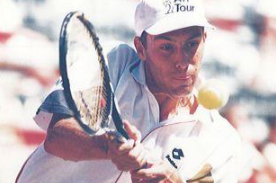
OC: As a player growing up what did Davis Cup mean to you?
SL: It meant to compete for the 1st time as a team and for Canada. It was important for me because I had the chance to win the Jr. Davis Cup (Sunshine Cup) and it was a huge booster for my jr career. It was always a goal to be on the team.
OC: Give us a memory or two that stick out from your DC experience:
SL: Against Netherlands in Toronto. First time we qualify for the world group after travelling to horrible places in South America. Getting our asses kicked by Spain (Murcia) in the 1st round against an unknown kid at the time: Sergie Brugera.
OC: What did you think of Canada’s win?
SL: A dream come true! Pride, joy and a feeling of accomplishment since I worked hard at the board level to come up with a plan to have our A team compete in Valencia and in the Finals.
Memories of Chile
Brian Gyetko
ONcourt : Gyetko played collegiately at Arizona State University from 1987 – 1991, where he achieved NCAA All-American status. Brian is a graduate in Aerospace Engineering and is heavily involved with the development of sports.
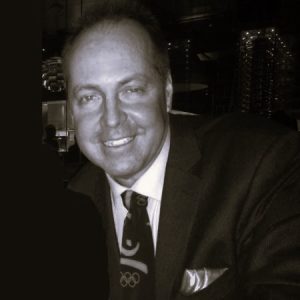 My best memory was playing doubles in Chile, with a hostile crowd, in a small 7000-seat stadium in the parking lot of the Chilean Soccer Stadium in Santiago. This was the same stadium where political prisoners were kept before being shipped to sea
My best memory was playing doubles in Chile, with a hostile crowd, in a small 7000-seat stadium in the parking lot of the Chilean Soccer Stadium in Santiago. This was the same stadium where political prisoners were kept before being shipped to sea
It is always a privilege to represent your country and be together with a group of high-performance players with a common goal.
It’s been a struggle to get there, but it is well deserved to finally win the whole thing.
About Davis Cup:
It also would be nice to see the Davis Cup be reformatted as it seems like it takes too much time out of the top performers. It’s good that it has gone to 2 out of 3 sets. But here is my idea:
- Make the Davis Cup run 2 to 3 weeks long, maybe after US Open, with all the countries in the world submitting 6 singles players and 3 doubles teams.
- Rank the teams with the lowest combined singles ranking and double rankings if need be, based on the highest 6 players in the country (assume everyone shows up)
- Make the event all in one city that can handle it, maybe Palm Springs or South Florida.
- Worst ranked teams (maybe 50 of them) start the first 3 days and the next tear of 50 teams starts day 4 to 7 and the highest 32 start day 7
- Each dual match plays 6 singles players and you must play in order of ATP ranking, with position one worth 6 points, position 2 worth 5 points, down to position 1 worth 1 point. So there are 21 points at stake in singles.
- Same in doubles with 3 points for number one doubles 2 for number 2 and 1 for number 3. For another 6 points.
- Total points to win is 27 points. You need 14 to win the match.
- Singles play is morning or afternoon. If you get to 14 after singles, the dual is over.
- If you haven’t got to 14, then you come back as a team to play doubles in a night session.
- All singles a doubles matches are no add, 2 out of 3 sets, super tiebreaker for the 3rd set, to make things go fast and to encourage the top 10 players in the world to play. Not so hard on your body.
What I think this would do is get more of the top 20 players playing EVERY year. Depth of a country is also important, not just the top 2 players, although the number 1 and 2 singles has 11 points, you are only 3 points shy of a victory.
I think it is much better. You can see something similar happening with Laver Cup and Australia’s thing at the beginning of the year. They exist because the Davis Cup hasn’t reformed itself to keep up with the times.
I think it would be fun to watch. With the quick format, you could have 5 or 6 venues in the Palm Springs area host the event, and your singles matches are over in 90 minutes tops. Then, on 6 courts you could easily service the singles portion of the dual match in 2 hours. So you could slot in 8 am, 10 am, 12 noon, 2pm and 4 pm having 6 slots in a day. Only the doubles matches would move to the main center under the lights.
Would be fun. The top teams get a bye to the round of 32 and all the other teams would have qualifying and prequalifying to get 32 additional teams to the top 32 for a 64 round main draw, done in 7 days.
I think it is way better.
Orange Bowl Doubles Winner
Bobby Kokavec
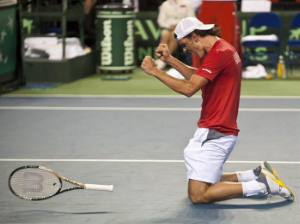 ONcourt: Kokavec represented Canada in a tie against Mexico in the 1998 Davis Cup competition. The tie, an American Group 1 Quarter-final in Halifax, was won by Canada.
ONcourt: Kokavec represented Canada in a tie against Mexico in the 1998 Davis Cup competition. The tie, an American Group 1 Quarter-final in Halifax, was won by Canada.
Davis Cup meant everything to me growing up, as I wanted to represent and play for my country.
I will always remember the team atmosphere hanging with the players, and knowing we were all supporting each other and a feeling you won’t get when playing regular ATP events where your just playing for yourself; we’re all on the same page, trying to win for Canada and move up in our group
I wasn’t surprised with Canada’s win in the Davis cup because we have so much more depth in players to choose from and improved so much, making us a contender
Repentigny’s Best
Joycelin Robichaud
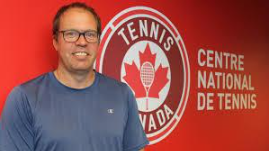 Jocelyn Robichaud (born 8 April 1978 in Joliette, Quebec) is a former tour professional tennis player. Robichaud captured three junior Grand Slam titles and played Davis Cup for Canada in the late 90’s early 2000. He is now in charge of Tennis Canada’s pipeline development., Robichaud played in four Canadian ties
Jocelyn Robichaud (born 8 April 1978 in Joliette, Quebec) is a former tour professional tennis player. Robichaud captured three junior Grand Slam titles and played Davis Cup for Canada in the late 90’s early 2000. He is now in charge of Tennis Canada’s pipeline development., Robichaud played in four Canadian ties
OC: When you think Davis Cup, tell us a memory of either a tie, a great match, a great incident, the location, etc:
JR: I remember joining my first Davis Cup ties, it was already a unique experience to practice and play with our top Canadian players who were well established on the pro tour (Grant Connell, Daniel Nestor, Sebastien Lareau and others) You learn so much from being around those guys on a day-to-day basis for an entire week. Something that you do not have the chance to do as a younger and lower rank player. I remember a practice with Grant, he was at the net and wasn’t missing a single volley as I was trying to be consistent but would always miss before him. I could sense his frustration because I was slightly more erratic than his top partners on the pro tour. I was getting more nervous by the minute, but it made me understand what the requirements were to play at that level. My second memory was watching Nestor on TV winning some key ties for Canada and I got lucky enough to have the chance to play with him later on.
OC: What it meant to you to represent Canada?
JR: To be selected to represent Canada is always a very proud moment and recognition by the selecting committee honoring your work/results achieved over the past few months. Tennis wasn’t broadcast as much as it is our days so I personally realized the importance of representing my country when I started to acknowledge everything that goes around the Davis Cup from an organization standpoint, the engagement/number of the supporting staff, the funding opportunity for your sport across the country and many more lateral effects that your selection and results can have by representing your country.
OC: What you think of Canada finally achieving the ultimate result?
There are numerous things that comes to my mind when we reflect on this ultimate results. First, how amazing it is for tennis in Canada. It confirms that we are a tennis nation and the work/contributions that everyone has put over the years/decades and almost a century is now rewarded. Second, I think of all the former Captains and players who struggled for so many years playing on different surfaces, mostly on clay in south America, playing abroad facing various obstacles and how it helped us develop our grit and pride, so Canada was ready to conquer when the stars aligned.
The Professor
Louis Cayer
 The “No one is a prophet in its own country” saying probably applies best to Louis. Cayer revolutionized the coaching certification in Canada while being a Davis Cup coach and Captain for ten years. He has become one of England’s most revered coaches, being part of their winning Davis Cup team in 2015 and producing an ongoing array of world top doubles players.
The “No one is a prophet in its own country” saying probably applies best to Louis. Cayer revolutionized the coaching certification in Canada while being a Davis Cup coach and Captain for ten years. He has become one of England’s most revered coaches, being part of their winning Davis Cup team in 2015 and producing an ongoing array of world top doubles players.
LC: It is funny because when I was growing up in tennis, I was a school teacher who complemented my income by teaching lessons for the City of Montreal. Only later in my mid-20s did I aspire to become a full-time coach, and then I realized what Davis Cup meant.
My best Canadian memory is our tie against Sweden in 1990, where we held our own against the best team in the world, losing 7-5 in the fifth set of the fifth match. It showed we could compete with the best. I also remember my last match as Captain of Canada’s team when we beat Argentina 3-2 at Jarry Park in Montreal.
I was very pleased with Canada winning the Cup. I am still Canadian; my allegiance is here to the team in England, but Canada’s win is the next best thing.

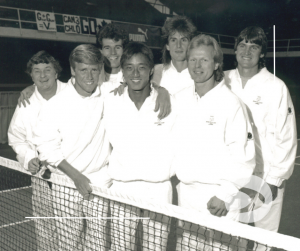
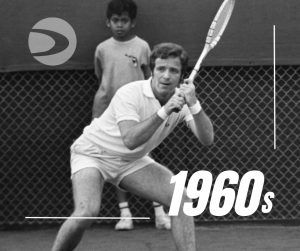
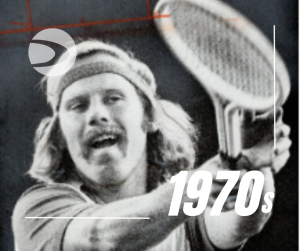
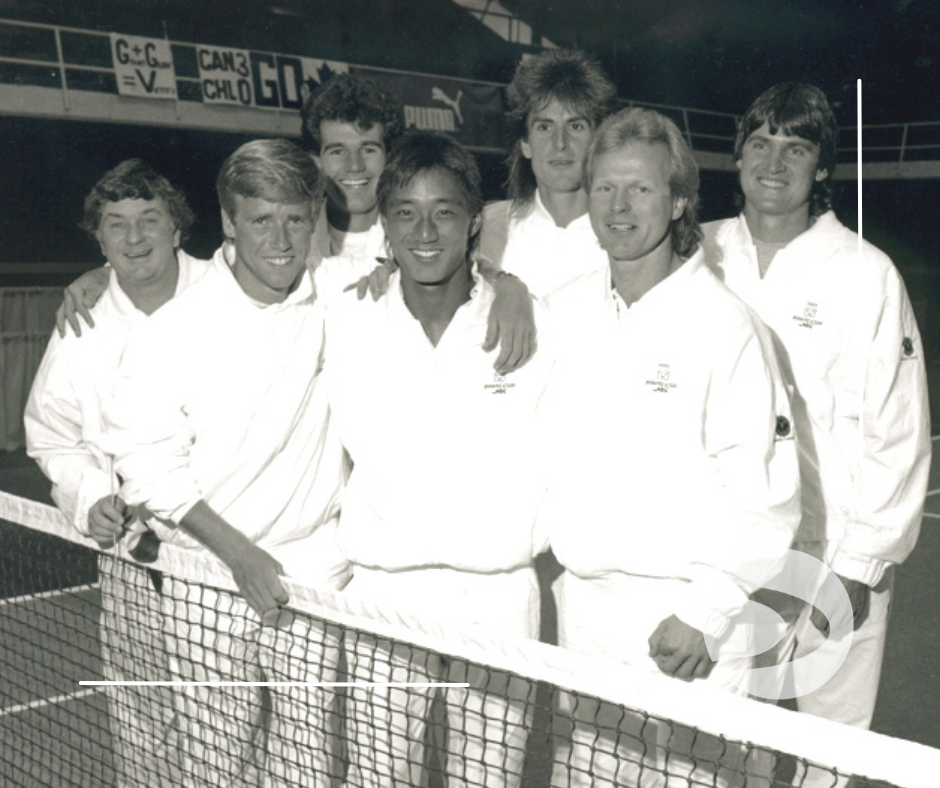
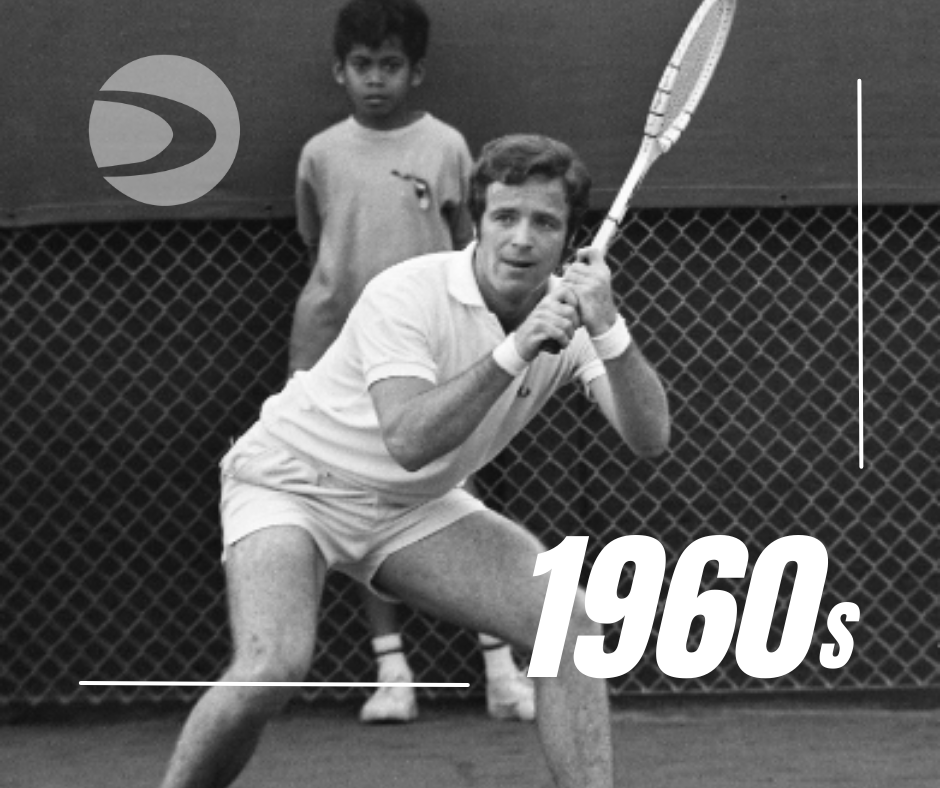
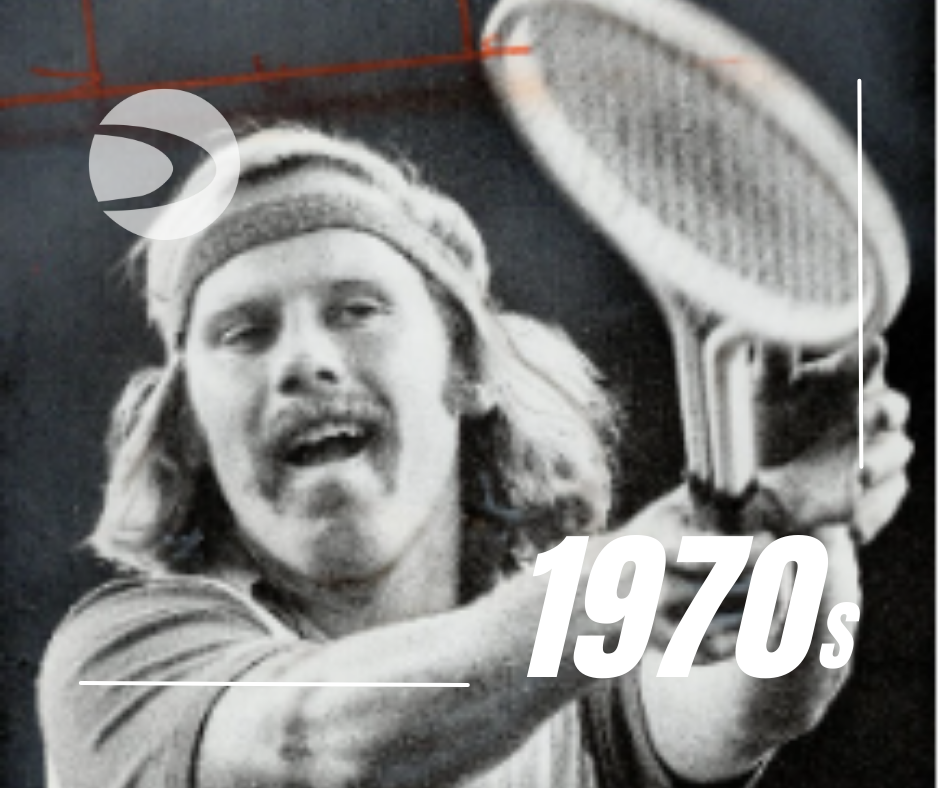
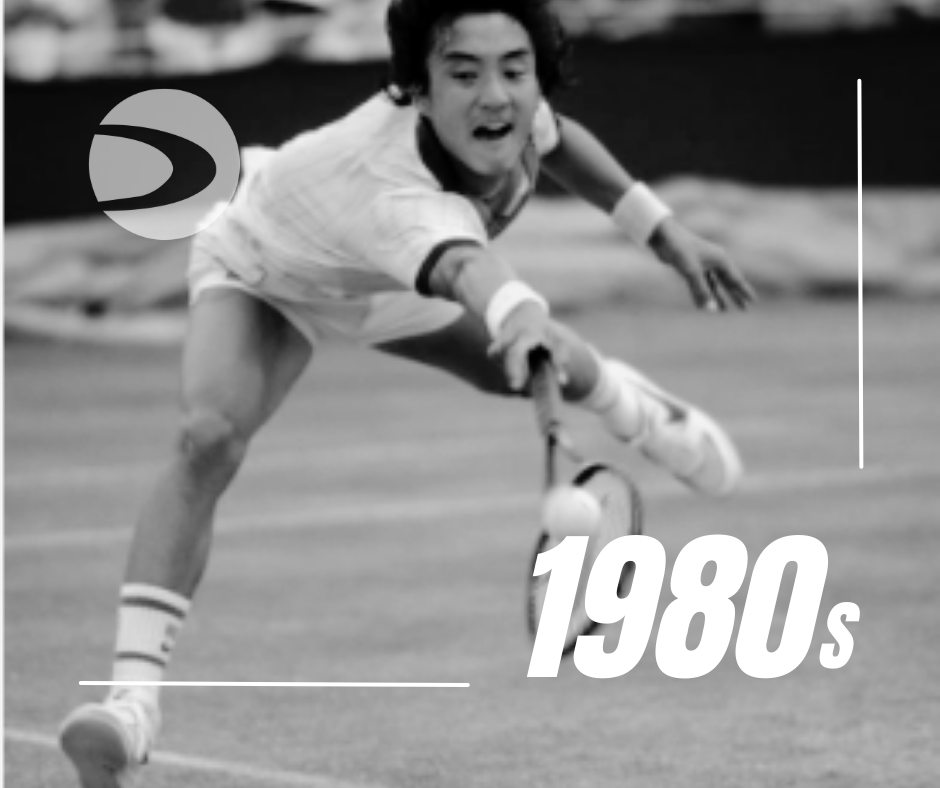
2 Responses
blah blah blah ba ba ? allegiance by hire .
Scott, this edition was written by Grant Connell, ;-] blah blah ba ba
We are not Americans but do have a pretty good sense of humour